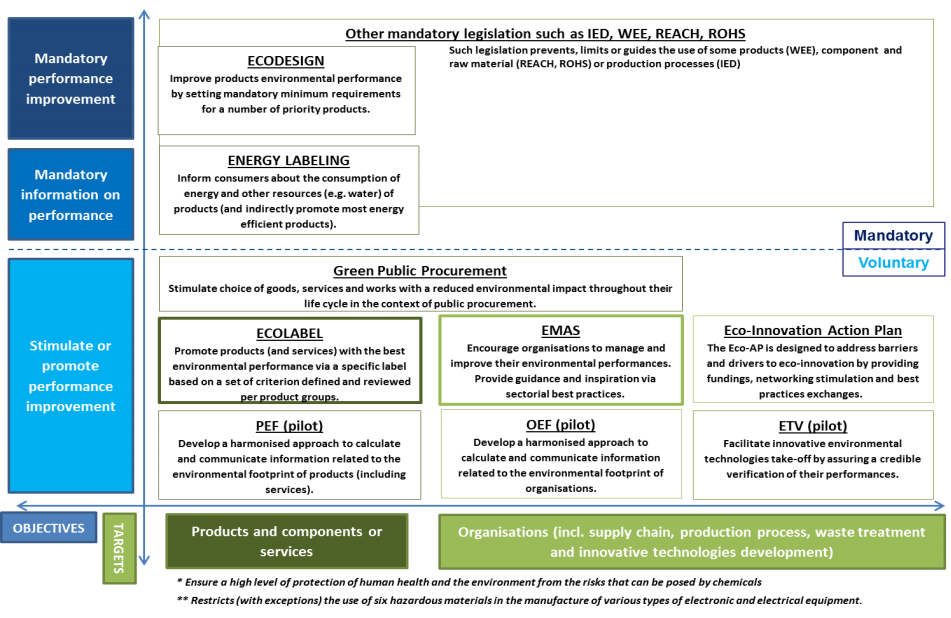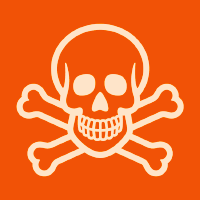// Documenti disponibili n:
46.024
// Documenti scaricati n:
35.366.513
Featured
EMAS, Ecolabel and other SCP tools
Permalink:
https://www.certifico.com/id/4285
EMAS, the EU Ecolabel and other SCP tools
Sustainable Consumption and Production (SCP) policy framework
This fitness check covers Regulation (EC) No 1221/2009 of the European Parliament and Council of 25 November 2009 on the voluntary participation by organisations in a Community ecomanagement and audit scheme (EMAS)(1) and Regulation (EC) No 66/2010(2) of the European Parliament and Council of 25 November 2009 on the EU Ecolabel, and their contribution to the Sustainable Consumption and Production (SCP) policy framework.
It is a retrospective exercise, aiming to assess the two Regulations’ actual performance.
The purpose of the fitness check is to evaluate the implementation of EMAS and EU Ecolabel Regulations and to assess their effectiveness, efficiency, relevance, coherence and EU added value. The fitness check is not evaluating the performance of the SCP policy framework as a whole, nor individual instruments other than EMAS and the EU Ecolabel.
The fitness check falls under the Commission’s Regulatory Fitness and Performance Programme. The work presented here is guided by the fitness check mandate for the EMAS and EU Ecolabel Regulations(3).
As the fitness check is a retrospective exercise, it does not answer forward-looking questions included in the mandate. The fitness check will be used by the Commission as a basis to inform future policy decisions on both schemes.
EMAS and the EU Ecolabel as part of the sustainable consumption and production framework
Economic activities connected to products and services have an impact on the Environment and on people’s health and quality of life.
Sustainable consumption and production mitigate the negative environmental impacts of such activities and balance the need for such mitigation with the need for economic and social development. Instruments like EMAS and the EU Ecolabel encourage voluntary activities with reduced environmental impact and improve their economic potential. EMAS and the EU Ecolabel are part of the EU policy framework for sustainable consumption and production. The EU Ecolabel was created in 1992 and EMAS in 1995 but both were re-launched as part of the Communication on sustainable consumption and production and the sustainable industrial policy action plan (SCP action plan) in 2008.
Since 2008, several initiatives have further developed the framework on sustainability. These include: the Communication on EUROPE 2020
- a strategy for smart, sustainable and inclusive growth;
(5) the Communication on a Roadmap to a Resource Efficient Europe;
(6) the seventh EU Environmental action programme calling for a more effective and coherent SCP policy framework(7) and the 2015 EU action plan for the circular economy.
(8) In the Communication ‘Building the single market for green products - facilitating better information on the environmental performance of products and organisations’(9), the Commission recognised the need for a common method to quantify the environmental impact (footprint) of products and organisations and benchmark them against each other (within the same product group(10) or sector).
Such work has clear links to both the EU Ecolabel and EMAS, but as this work is still in the pilot phase, results were not available for inclusion in this fitness check.

1 Regulation (EC) No 1221/2009 of the European Parliament and Council of 25 November 2009 on the voluntary participation by organisations in a Community eco-management and audit scheme (EMAS).
2 Regulation (EC) No 66/2010 of the European Parliament and Council of 25 November 2009 on the EU Ecolabel and their contribution to the Sustainable Consumption and Production (SCP) policy framework.
3 Fitness check Mandate for EU-EMAS and EU-Ecolabel regulations.
4 COM(2008) 397.
5 COM(2010) 2020.
6 COM(2011) 571.
7 Decision No 1386/2013/EU.
8 COM(2015) 614/2.
9 COM(2013) 196.
10 The EU Ecolabel Regulation defines a product group as ‘a set of products that serve similar purposes and are similar in terms of use, or have similar functional properties, and are similar in terms of consumer perception.
EMAS
A. Regolamento (CE) n. 1221/2009 del Parlamento europeo e del Consiglio del 25 novembre 2009 sull’adesione volontaria delle organizzazioni a un sistema comunitario di ecogestione e audit (EMAS), che abroga il regolamento (CE) n. 761/2001 e le decisioni della Commissione 2001/681/CE e 2006/193/CE
ECOLABEL
B. Regolamento (CE) N. 66/2010 del Parlamento europeo e del Consiglio del 25 novembre 2009 relativo al marchio di qualità ecologica dell’Unione europea
ECODESIGN
C. Direttiva 2009/125/CE del Parlamento europeo e del Consiglio del 21 ottobre 2009 relativa all'istituzione di un quadro per l’elaborazione di specifiche per la progettazione ecocompatibile dei prodotti connessi all’energia.
ENERGY LABELLING
D. Direttiva 2010/30/UE del Parlamento europeo e del Consiglio del 19 maggio 2010 concernente l’indicazione del consumo di energia e di altre risorse dei prodotti connessi all’energia, mediante l’etichettatura ed informazioni uniformi relative ai prodotti.
PEF Pilot
The Environmental Footprint Pilots
OEF Pilot
Organisation Environmental Footprint
EVT Pilot
Environmental Technology Verification































